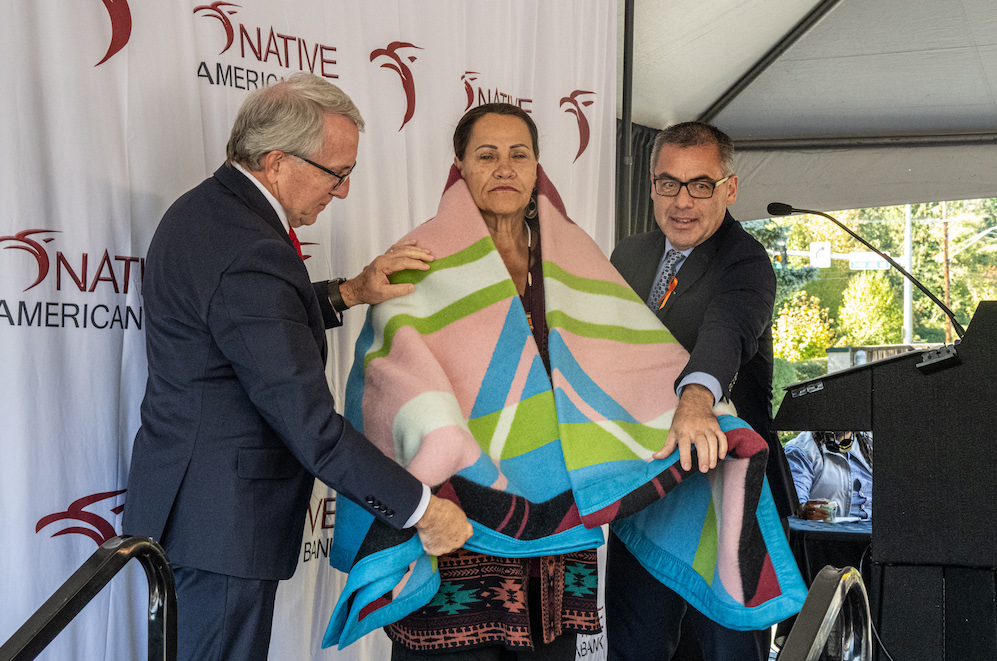
- Details
- By Brian Edwards
- Finance
Native American Bank opened its first retail branch in Washington state earlier this month, marking the next step in a strategic push into Pacific Northwest markets where nearly half of all federally recognized tribes are located.
The Tulalip branch, which recently began operations in Quil Ceda Village on the Tulalip Reservation, adds to the Denver-based bank’s commercial lending office in Issaquah. Together, the two locations position the institution to serve 11 tribal communities within 50 miles, said Ed Davis, the bank’s Pacific Northwest market president.
“This is a significant location in terms of access to the market and Puget Sound itself,” Davis said.
"We are honored to welcome Native American Bank on The Tulalip Tribes Reservation. Their longstanding support for economic well-being and sovereignty for Tribal nations and organizations is deeply appreciated and we look forward to their success to support our future generations," Teri Gobin, chairwoman of the Tulalip Tribes, said.
The Native-owned bank’s regional strategy covers Alaska, Washington, Oregon, Idaho and northern California — a territory that includes nearly 50% of federally recognized tribes and more than 200 Alaska Native corporations, according to Davis.
Native American Bank, chartered through an act of Congress in 1998, dedicates 95% of its business to Indian Country. The financial institution differentiates itself by focusing specifically on trust land transactions, which many larger institutions avoid due to federal regulatory complexities.
“A lot of banks, including some of the biggest banks in the country, do not want to navigate what it feels like to try and do business on trust land,” Native American Bank CEO Tom Ogaard told Tribal Business News. “Federal trust land is a completely different element, and it's one that's not easily navigated.”
The Tulalip branch spans 4,700 square feet with an additional 1,500 square feet for a drive-thru canopy. The facility, leased from the Tulalip Tribes, will initially employ six staff members, with room to grow. Services include retail banking with checking, savings, money market accounts, CDs, and online and mobile banking; consumer lending with secured and unsecured loan options; tribal and commercial banking and lending, with a minimum loan size of $100,000; cannabis banking; and CRA and social impact deposit products.
The financial institution entered the Pacific Northwest market in September 2023 by opening its Issaquah, Wash. office, which provides commercial lending for tribes and enterprises in areas such as construction, real estate and equipment finance. Much of that work is tied to bridge and construction financing, Davis said.
Native American Bank currently has a $120 million lending pipeline in the Pacific Northwest, Ogaard said.
In the region, the bank also plans to partner with Native community development financial institutions on large projects. Earlier this year, it worked with four Native CDFIs to provide a $5.2 million bridge loan to Metlakatla Power & Light for a broadband and energy project for the Metlakatla Indian Community on Annette Island, Alaska. Three Native CDFIs in the region — Juneau, Alaska-based Spruce Root; Lapwe, Idaho-based Nimiipuu Fund, and Nixyáawii Community Finance Services in Pendleton, Ore. — participated in the financing, alongside Longmont, Colo.-based Oweesta Corporation.
Native communities have historically faced challenges accessing traditional banking services, making physical branch presence particularly important.
The Tulalip branch will offer consumer banking services alongside commercial lending, requiring the bank to navigate varying tribal sovereignty laws since each tribe creates its own legal frameworks while adhering to federal regulations.
Ogaard said physical branches demonstrate commitment to tribal communities, where relationship-building occurs through face-to-face interactions rather than digital platforms. The bank plans additional locations in South Puget Sound and the Olympic Peninsula.
The institution also collaborates with other Native CDFIs on complex financing deals and provides financial education programs for tribal members to address banking distrust in reservation-based communities.
Native American Bank will hold a grand opening celebration for the Tulalip branch on September 30.
